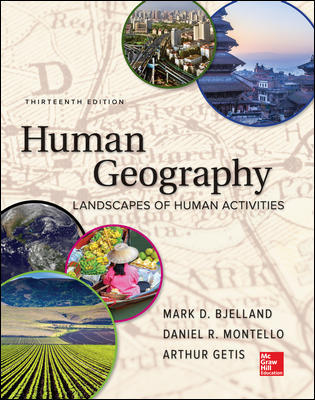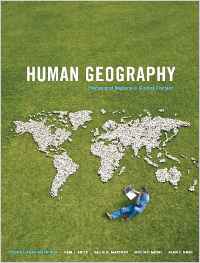Description
Test Bank Human Geography 13Th Edition By Mark Bjelland
1 Introduction: Some Background Basics
Part 1 Themes and Fundamentals of Human Geography
2 Roots and Meaning of Culture
3 Spatial Interaction and Spatial Behavior
4 Population: World Patterns, Regional Trends
Part 2 Patterns of Diversity and Unity
5 Language and Religion: Mosaics of Culture
6 Ethnic Geography: Threads of Diversity
7 Cultural Identities and Cultural Landscapes: Diversity and Uniformity
Part 3 Dynamic Patterns of the Space Economy
8 Economic Geography: Primary Activities
9 Economic Geography: Manufacturing and Services
10 Economic Development and Change
Part 4 Landscapes of Functional Organization
11 Urban Systems and Urban Structures
12 The Political Ordering of Space
Part 5 Human Actions and Environmental Impacts
13 Human Impacts on Natural Systems
Human Geography, 13e (Bjelland)
Chapter 1 Introduction: Some Background Basics
1) Spatial systems can be the basis for defining a region.
Answer: TRUE
Section: 1.1 Getting Started
Topic: Introduction
Bloom’s: 1. Remember
Subtopic: Geography
Accessibility: Keyboard Navigation
2) Who reputedly coined the term “geography”?
A) Hipparchus
B) Strabo
C) Ptolemy
D) Eratosthenes
Answer: D
Section: 1.1 Getting Started
Topic: Geographic Concepts
Bloom’s: 1. Remember
Subtopic: Introduction to Geography
Accessibility: Keyboard Navigation
3) The Muslim scholar Idrisi compiled a major geographic treatise for Roger II, the Christian king of Sicily. That such interaction could take place reflects in part what locational attribute of 12th century Sicily?
A) site
B) situation
C) absolute distance
D) hierarchical diffusion
Answer: B
Section: 1.2 Core Geographic Concepts
Topic: Geographic Concepts
Bloom’s: 2. Understand
Subtopic: Introduction to Geography
Accessibility: Keyboard Navigation
4) The cardinal direction of north is this type of direction:
A) absolute
B) relative
C) multi-directional
D) culturally dependent
Answer: A
Section: 1.2 Core Geographic Concepts
Topic: Geographic Concepts
Bloom’s: 1. Remember
Subtopic: Introduction to Geography
Accessibility: Keyboard Navigation
5) Two stores are equally spaced in linear distance from your residence. However, you choose to shop at the store that it takes less time to reach. Your decision reflects using a temporal measure of distance that also can be called ________.
A) absolute distance
B) relative distance
C) travel distance
D) geographic distance
Answer: B
Section: 1.2 Core Geographic Concepts
Topic: Geographic Concepts
Bloom’s: 2. Understand
Subtopic: Introduction to Geography
Accessibility: Keyboard Navigation
6) There are two routes between your residence and the library that are equal in both mileage and in the time it takes to cover that distance. One route, however, is perceived as being less safe than the other one and is avoided by you. Such a decision demonstrates what type of transformation of distance?
A) linear
B) relative
C) psychological
D) imagined
Answer: B
Section: 1.2 Core Geographic Concepts
Topic: Geographic Concepts
Bloom’s: 2. Understand
Subtopic: Introduction to Geography
Accessibility: Keyboard Navigation



Be the first to review “Test Bank Human Geography 13Th Edition By Mark Bjelland”